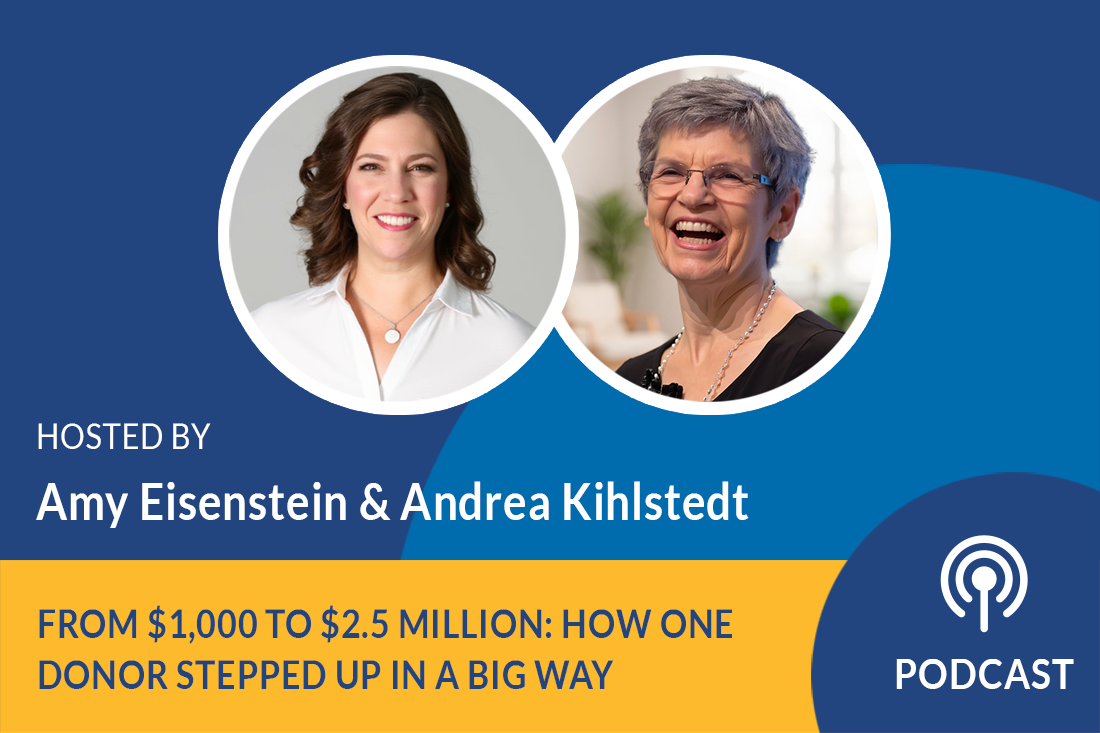Podcast: Your Money Mindset and Why It Matters

Season 2, Episode 46
Campaign experts Amy Eisenstein and Andrea Kihlstedt urge you to get the right mindset about money before asking donors for gifts. Adopt a positive money mindset and you’ll raise more money.
Listen Now:
This podcast is the second of a special Summer Series of conversations on important fundraising topics. Our live webinars will return on September 12, 2022; learn more at ToolkitTalks.com.
Andrea Kihlstedt:
Hi there. I’m Andrea Kihlstedt and I’m here with the co-founder of Capital Campaign Pro, Amy Eisenstein. In this podcast, Amy and I are going to talk to you about the money mindset. In fact, your money mindset and why it matters. If you develop a positive mindset about money and the power of being generous, you will be a better fundraiser. It’s really that simple. Mindset probably matters more than just about anything else when it comes to asking people for money.
Amy, what’s your money mindset?
Amy Eisenstein:
Yeah, I think it has actually changed a lot over the years and a lot of people, including myself growing up, we heard things like money doesn’t grow on trees or wealthy people are stingy or, I don’t know, whatever the negative connotations about money and money grubbing and all these things that we think about when it comes to money. And don’t talk about money. It’s impolite to talk about money. Don’t ask people what they make or how much they spent on their house.
So we have this real stigma around money in our culture, in our community, in our country. And so I think asking for money is really hard for lots of people talking about money. So it’s critical for fundraisers to shift their thinking in order to be successful at fundraising.
Shifting Your Mindset on Fundraising
Andrea Kihlstedt:
Yeah, I think that’s right. It’s so very important. And how do we go about shifting our mindset? Well, I can give you a way I do it, a way I work on it. That even though I’ve been in this business a very long time, there are times when talking about money still makes me uncomfortable. But if I can remember that when I’m asking someone for money, it’s not really about money at all. It’s about the mission of the organization or the project I’m asking them for. It all of a sudden gets easier.
Amy Eisenstein:
I think that —
Andrea Kihlstedt:
Hard to remember that sometimes.
Amy Eisenstein:
I think that’s so important. I mean, I started to say that my money mindset has really shifted as I’ve grown and developed in this field. And I think you just hit the nail on the head. That is what it’s all about. We have to get away from this idea that we’re asking for money. And we have to remember that we’re asking for impact. We’re asking for mission, we’re asking for others. And so, if you feel like you’re asking for yourself or that you’re begging, or that you’re twisting arms, all of these negative things that we talk about when we talk about money, we really want to shift our mindset and our money mindset to inspiring. What can these resources accomplish? What are we trying to do? And your fundraising is going to improve dramatically.
Andrea Kihlstedt:
Money by itself actually isn’t very interesting. I mean, if you take $1,000 and put it in your desk drawer, it doesn’t do much of anything. But you take that $1,000 and say, “Well, what can I put it to that will make a difference in the world?” All of a sudden starts getting interesting, because you’re looking at the difference you’re making in the world. You can keep your mind at that. And when you talk to your donors, be all about that, not the money itself and how much money you have or you don’t have, but the power or impact as Amy says of what that money can do. Then fundraising becomes quite fun. And the very idea of cultivating in yourself a generous spirit, I think is a powerful notion. I mean, I think I’ve become more generous through being in this business over years. It turns out I feel happy when I’m generous, don’t you?
Amy Eisenstein:
I think that’s so true. And that was an important lesson I learned as a young fundraiser. I was asking for one of my first major gifts and the donors were so happy and so excited and busy thanking me and I thought, oh my gosh, I’m supposed to be thanking them. And the reality is that when giving is done right, it feels great. There’s probably not too many donors who have their name on a building who feel badly about it. They feel proud. They feel honored. They feel really good. And you don’t need your name on a building to feel good about giving. Giving it all levels feels good, but the reality is the bigger the gift for your own pocketbook, the better it feels. And something that you said to me years ago really shifted my money mindset.
As fundraisers, we get lots of solicitations. I personally give to lots of organizations, $50 or $100 here and there. But when an organization comes to me with a compelling case for support, I can pretty easily give five or 10 or 20 times the amount that I give when they just ask through the mail or I get an email or a letter. So if I’m giving $100 to an organization, and that is not a big stretch for me financially, if they sit down with me and make a compelling case, I could almost as easily give 10 times that. I could give a thousand dollars. And it really is a shift in my mindset and thinking about what kind of impact I want to have, what difference I want to make. And it’s not about the money.
Two Different Mindsets: Asker and Donor
Andrea Kihlstedt:
Amy, this is an interesting conversation because we’re talking about mindset in two different ways. One is the mindset of the asker. And as an asker, you feel stingy. You think that giving is problematic. That asking is somehow stealing from people or getting them to do something they don’t want to do. That’s going to color the whole way you have a conversation with them. So that’s one side of this topic. The other side of the topic is the money mindset of the giver, which you just talked about Amy.
Amy Eisenstein:
Yes.
Andrea Kihlstedt:
Right. And you can give $1,000 instead of giving $100 just by shifting mindset, just by getting beyond the fact that it’s not a hundred dollars really, it is what is the impact that $1,000 could make and that you have the potential, the capacity to make that kind of an impact. So both sides have to do with focusing on impact rather than on money. Seeing money only as the go between, if you will, as the transaction part of the process, but not as the real power of the process.
Amy Eisenstein:
And I think that, even in my example, although I did segue into the donor’s mindset of course, it’s up to the person from the organization to make that case because a letter wasn’t compelling me to give $1,000. It was only compelling me to give $100. But when an asker showed up and said, “Here’s why you should give more,” that shifted my money mindset as the donor.
So I think you’re right to point out on both sides. And mostly our audience here, anybody listening is probably on the asking side, but it’s important to understand both. Thinking about how your money mindset impacts how you color the conversation. If you think that donors can’t give a lot and people aren’t generous or money is evil, it’s going to be a problem in how you communicate with donors.
Andrea Kihlstedt:
Ah, such a big topic, Amy, and we’ve just barely scratched the surface. We should come back to it another time, but why don’t you wrap it up for us today?
Amy Eisenstein:
Excellent. All right. I think that we have really gotten people’s wheels turning and started their thinking about shifting their money mindset. And the reality is that it really is possible to make the shift. And so if you stop thinking about your asks as asking for money, but really start asking for impact, it will make a huge difference. So if you want to learn more, I hope that you will visit the Capital Campaign Pro blog and website. We’ve got lots of great information there.
If you are thinking about a campaign and want help with your solicitation skills and training. Maybe your board needs training. Maybe you want to work with one of our expert advisors to make sure that you are confident in your asking skills, go to capitalcampaignpro.com and sign up for a free strategy session to see if we might be the right advisors for you. So thank you so much for joining us today and we’ll see you next time.



Leave a Comment